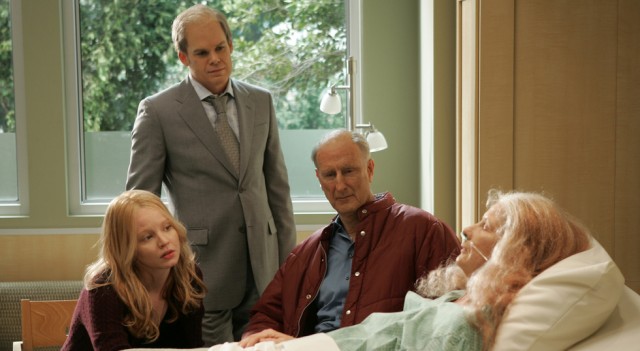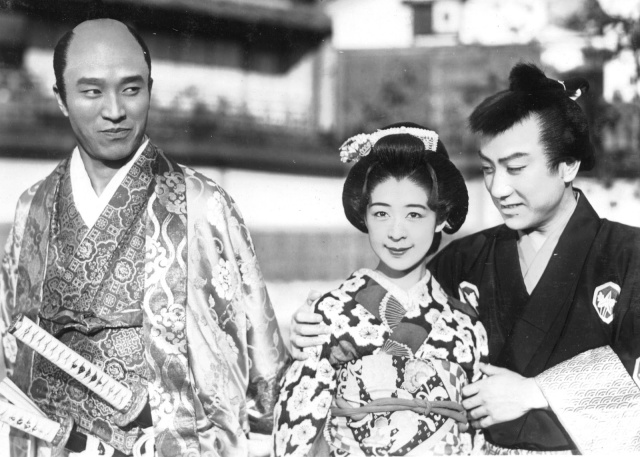
Oharu (Haruyo Ichikawa) finds herself caught between Lord Minezawa (Dick Mine) and Reisaburō (Chiezō Kataoka) in SINGING LOVEBIRDS
SINGING LOVEBIRDS (OSHIDORI UTAGASSEN) (鴛鴦歌合戦) (Masahiro Makino, 1939)
Japan Society
333 East 47th St. at First Ave.
Tuesday, April 12, 7:00
Festival runs April 8-23
212-715-1258
www.japansociety.org
 In the 1930s, on the cusp of WWII, Japan was in the process of creating its own cinematic musical genre. One of the all-time classics is the wonderful Singing Lovebirds, a period romantic rectangle set in the days of the samurai. Oharu (Haruyo Ichikawa) is in love with handsome ronin Reisaburō (Chiezō Kataoka), but he is also being pursued by the wealthy and vain Otomi (Tomiko Hattori) and the merchant’s daughter, Fujio (Fujiko Fukamizu), who has been promised to him. Meanwhile, Lord Minezawa (jazz singer Dick Mine) has set his sights on Oharu and plans to get to her through her father, Kyōsai Shimura (Takashi Shimura), a former samurai who now paints umbrellas and spends all of his minuscule earnings collecting antiques. “It’s love at first sight for me with this beautiful young woman,” Lord Minezawa sings about Oharu before telling his underlings, “Someone, go buy her for me.” But Oharu’s love is not for sale. Directed by Masahiro Makino, the son of Japanese film pioneer Shōzō Makino, Singing Lovebirds is utterly charming from start to finish, primarily because it knows exactly what it is and doesn’t try to be anything else, throwing in a few sly self-references for good measure.
In the 1930s, on the cusp of WWII, Japan was in the process of creating its own cinematic musical genre. One of the all-time classics is the wonderful Singing Lovebirds, a period romantic rectangle set in the days of the samurai. Oharu (Haruyo Ichikawa) is in love with handsome ronin Reisaburō (Chiezō Kataoka), but he is also being pursued by the wealthy and vain Otomi (Tomiko Hattori) and the merchant’s daughter, Fujio (Fujiko Fukamizu), who has been promised to him. Meanwhile, Lord Minezawa (jazz singer Dick Mine) has set his sights on Oharu and plans to get to her through her father, Kyōsai Shimura (Takashi Shimura), a former samurai who now paints umbrellas and spends all of his minuscule earnings collecting antiques. “It’s love at first sight for me with this beautiful young woman,” Lord Minezawa sings about Oharu before telling his underlings, “Someone, go buy her for me.” But Oharu’s love is not for sale. Directed by Masahiro Makino, the son of Japanese film pioneer Shōzō Makino, Singing Lovebirds is utterly charming from start to finish, primarily because it knows exactly what it is and doesn’t try to be anything else, throwing in a few sly self-references for good measure.
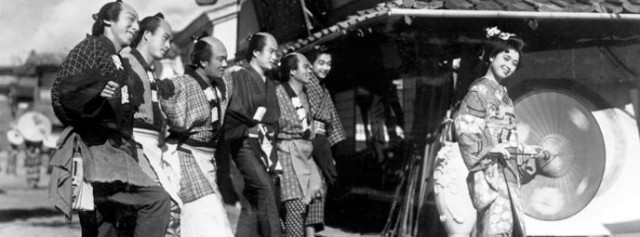
A romantic rectangle is at the center of Masahiro Makino’s charming 1939 musical, SINGING LOVEBIRDS
Made in a mere two weeks while Kataoka was ill and needed a break from another movie Masahiro Makino was making — he tended to make films rather quickly, compiling a resume of more than 250 works between 1926 and 1972 — Singing Lovebirds features a basic but cute script by Koji Edogawa, playful choreography by Reijiro Adachi, a wide-ranging score by Tokujirō Ōkubo, silly but fun lyrics by Kinya Shimada, and black-and-white cinematography by Kazuo Miyagawa, who would go on to shoot seminal films by Akira Kurosawa, Kenji Mizoguchi, Yasujirō Ozu, and Kon Ichikawa. There are fab touches throughout the film, from the comic-relief group of men who follow Otomi around, professing their love, to the field of umbrellas made by Kyōsai that resembles a mural by Takashi Murakami, to a musical number sung by Lord Minezawa in which the musicians are clearly not playing the instruments that can be heard on the soundtrack. And of course, it’s also worth it just to hear the great Takashi Shimura, who appeared in so many classic Kurosawa films, sing, although he doesn’t dance. Singing Lovebirds might not have tremendous depth, primarily focusing on money and greed, love and honesty, but the umbrellas do serve as clever metaphors for the many different shades of humanity, for places to hide, and for ways of seeking protection from a world that can be both harsh and beautiful. Singing Lovebirds is screening April 12 at 7:00 as part of Japan Society’s 2016 Globus Film Series “Japan Sings! The Japanese Musical Film,” which continues through April 23 with such other musicals as Tomu Uchida’s Twilight Saloon, Kihachi Okamoto’s Oh, Bomb, Nagisa Oshima’s Sing a Song of Sex, and Tetsuya Nakashima’s Memories of Matsuko.
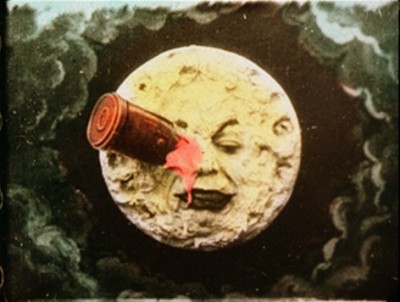
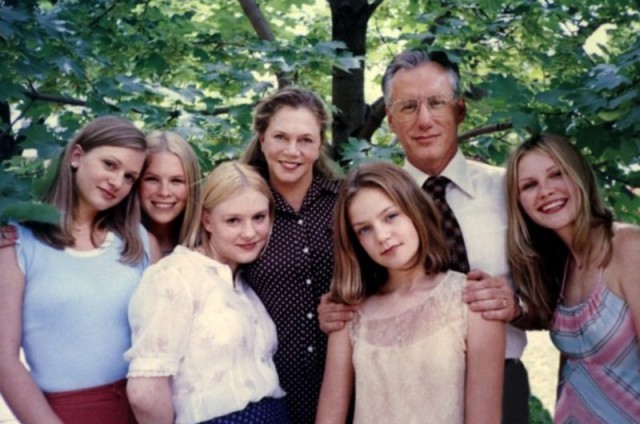


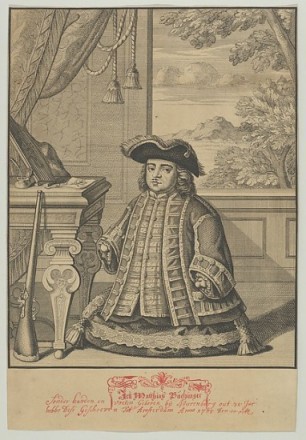
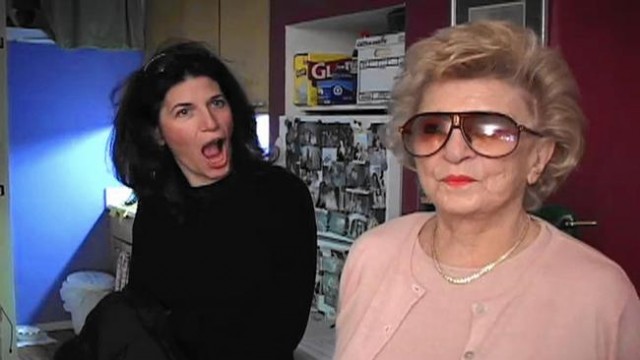
 “Am I ever going to be able to understand, forgive, and cherish my mother, before time runs out?” filmmaker Gayle Kirschenbaum asks at the beginning of her debut feature documentary, Look at Us Now, Mother! In the film, Kirschenbaum, who previously made the cable hit A Dog’s Life: A Dogamentary and the film festival short My Nose, about her mother’s extreme dislike of her daughter’s nose — and which Kirschenbaum is currently attempting to turn into a full feature, The Bigger Version — spends eighty-four minutes detailing her relationship with her mother, Mildred Abramowitz Kirschenbaum, which was more than rocky from the day Gayle was born, when Mildred, who clearly expected and wanted another boy to join her two older sons, got a baby girl instead. Gayle brings together old home movies, travel footage, visits to a pair of therapists and a plastic surgeon, and interviews with her two brothers and her mother’s friends and first cousins to paint a not-too-pretty picture of Mildred, who lives in Boca Raton and has been putting Gayle down and blaming her since the very beginning. In the film, Mildred claims that she has no idea why her daughter is complaining now, although on one therapist visit, she does admit to at least one Mommie Dearest moment. It’s often painful to watch as Gayle, who wrote, directed, and produced the film in addition to editing it with Alex Keipper and shooting it with Steven Gladstone, relives much of the psychological and emotional torture she experienced at the hands of her parents, primarily her mother, who continues to be nasty, rude, uncaring, and disapproving, even if Mildred doesn’t admit it and even if, deep down, she truly loves her daughter. “We are now off to go to see a therapist,” Mildred says at one point. “We’re going to find out what’s wrong with Gayle’s relationship with me.”
“Am I ever going to be able to understand, forgive, and cherish my mother, before time runs out?” filmmaker Gayle Kirschenbaum asks at the beginning of her debut feature documentary, Look at Us Now, Mother! In the film, Kirschenbaum, who previously made the cable hit A Dog’s Life: A Dogamentary and the film festival short My Nose, about her mother’s extreme dislike of her daughter’s nose — and which Kirschenbaum is currently attempting to turn into a full feature, The Bigger Version — spends eighty-four minutes detailing her relationship with her mother, Mildred Abramowitz Kirschenbaum, which was more than rocky from the day Gayle was born, when Mildred, who clearly expected and wanted another boy to join her two older sons, got a baby girl instead. Gayle brings together old home movies, travel footage, visits to a pair of therapists and a plastic surgeon, and interviews with her two brothers and her mother’s friends and first cousins to paint a not-too-pretty picture of Mildred, who lives in Boca Raton and has been putting Gayle down and blaming her since the very beginning. In the film, Mildred claims that she has no idea why her daughter is complaining now, although on one therapist visit, she does admit to at least one Mommie Dearest moment. It’s often painful to watch as Gayle, who wrote, directed, and produced the film in addition to editing it with Alex Keipper and shooting it with Steven Gladstone, relives much of the psychological and emotional torture she experienced at the hands of her parents, primarily her mother, who continues to be nasty, rude, uncaring, and disapproving, even if Mildred doesn’t admit it and even if, deep down, she truly loves her daughter. “We are now off to go to see a therapist,” Mildred says at one point. “We’re going to find out what’s wrong with Gayle’s relationship with me.” 


